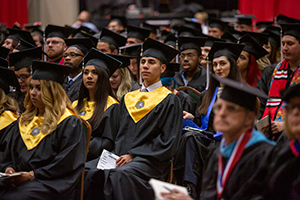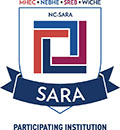Student Success Advising Make Your Time Count
7777 South May Avenue
Oklahoma City, OK 73159
Hours of Operation:
Mon-Thu: 8 a.m.-6 p.m.
Fri: 8 a.m.-5 p.m.*
*Please note the third Friday of every month the Office of Student Success Advising will open at 10 a.m.
Make Your Time Count
How Can You Get the Most Out of CLASS Time?'
1. Skip the Back Row
If you sit in the back row, you have added numerous distractions between you and the instructor. Each chair and each person is a potential distraction to keep you from learning. Sitting toward the front of the room eliminates some of those distractions.
2. Be Focused
Be mentally present in the class. Don’t be monitoring your text messages and social media. Focus on the information being presented. Ask questions. Be engaged and focused.
3. Come Prepared
Read the content for the next class before coming to class. Complete your homework. Have a list of questions written to ask your instructor during class to help you as you continue learning. Ask specific questions. Don’t just say, “I don’t understand.” A better question would be, “I don’t understand how to calculate the number of Kilocalories per gram of fat.”
4. Take Notes
Take a lot of notes. Consider using Cornell Notes to assist you as you work.
How Can You Get the Most Out of ONLINE CLASS Time?
There’s a popular myth that says online courses are easier than on campus courses. That isn’t true. Students are expected to learn the same content regardless of whether the course is on campus or online. There are still regular deadlines to meet and textbook chapters to ready.
What are the two big differences between on campus and online?
1. No regularly scheduled class meetings
2. No face-to-face conversations with your instructor on a regular basis
Once your expectations are adjusted, the online course can cause feelings of loss or searching for how to do an online course. Below are some strategies to help make your time count in an online course.
1. Make a Date and a Place
Schedule your time and place to work on your online course. While this time can fluctuate day to day, it’s important to schedule that time and keep that appointment with your course.
2. Read Your Syllabus and course Schedule
Before you begin your course work, it is important to read your course syllabus. What is expected? Find the course schedule of due dates. Place them on your calendar and work to be prepared for those deadlines.
3. Plan Ahead
Your professor has provided you with due dates. Don’t wait until 11:50 p.m. when an assignment is due at 11:59 p.m. Plan ahead! Some students fine it useful to plan to complete an assignment 1 day before it’s due to allow for any issues with technology.
4. Have a Back Up Plan
An online course is technology-dependent by nature. Technology is not 100% guaranteed to work as we think it should. Plan for a tech issue! What is your back up plan? If your computer begins to experience issues, what is your plan to complete your course work? Do you have a friend or family member who would let you use a computer? Are you near enough to OCCC to allow you to access the lab computers? Is there a public library near you that has computer access?
Plan ahead. Most OCCC instructors are understanding of technology issues but there is also an expectation that students will have a back up plan in the event an issue arises.
5. Get Help
Some people when they are lost view that as an opportunity for adventure. Others view it as a terrifying experience. Being lost in an online course is not usually a chance to explore new territories. It’s time to seek help.
Here’s who to contact for help:
- If you have a problem with your course content...Contact your instructor (see syllabus for specifics)
- If you have a problem learning the course content...Contact the content-related Student Learning Labs
- If you have a Moodle problem...Contact Moodle Student Tech Support
- If you have technology, username/password issues...Contact the OCCC Helpdesk 682-7777
6. Stay Organized
Staying organized for an online course involves a bit more than a clutter-free workspace or a notebook. It can be a challenge to be digitally organized. Here are some tips to help you stay organized in a digital world.
Make Your Study Time Count
How much should I study?
It is recommended that all college students expect to spend 2-3 hours per week studying per credit hour.
For example:
English Composition I (ENGL 1113) is a 3 hour course. A student could expect to study 6-9 hours per week for this course.
Study Hacks to Make Your Study Time Count
1. Approach your study time in a positive way
If you view it negatively or dread sitting down to study, it will not be as productive as it could be. If you begin studying and find you need assistance, get some help! It's OK. That's part of the learning process to read and learn and get help when the content isn't as clear as it should be. You can get help from your professor or from the OCCC Learning Labs.
2. Remove distractions
What are the things that fight for your attention? Your children, spouse/partner, household chores, TV, music, email, boss, or phone? Whatever your distraction, try to find a place where you can study without them. The belief that one must study in a completely quiet environment is not widely held any longer. Some like noisy busy places. Others prefer soft noises in the background. Still others desire the peace and quiet. OCCC has some great places to study based on the environment that is best for you.
3. Be prepared to study
Take care of your physical needs before you begin. If you find yourself wanting a snack, prepare one and have it within reach as you work. Have everything you need to work. Pens, pencils, calculator, textbook, notes, etc. Time will be wasted searching for those items if you don't have them available to you.
4. Be organized
There is an old saying "An ounce of prevention is worth a pound of cure.". This saying means that if you put a little effort into organizing your notes and materials at the beginning of the semester (or as the need arises), it will save you time as you work.
5. Rewrite or summarize your notes
Whether you choose to use Cornell Notes or another type of note taking strategy, rewriting notes can be very effective in helping the notes you have taken make their way to your memory. You may choose as you rewrite them to organize them differently or highlight sections of them as you work and learn. Reading your notes aloud to yourself or someone else can also be useful in memorization of material.
6. Practice, practice, practice
Be patient as you learn. It takes time. It takes practice. Flashcards are a helpful strategy to use as you study. StudyBlue is a free site the features many free decks of flashcards. You can use the site to collaborate with your classmates as you build your flashcards. Flash cards allow you to quiz yourself to test what you really know. Don't fall victim to feeling comfortable as you read your notes repeatedly. You can be comfortable with the process of reading the notes, but that doesn't mean you know the material.
7. Study alone or with others, just study
Some of your classmates might be organizing a study group to prepare for an exam. Think about how you study best. Do study groups support your learning style?
If study groups are a match of your learning preferences, it can be very helpful to recite the content to each other. It can also be useful for one group member to ask questions related to the content of others in the group.









